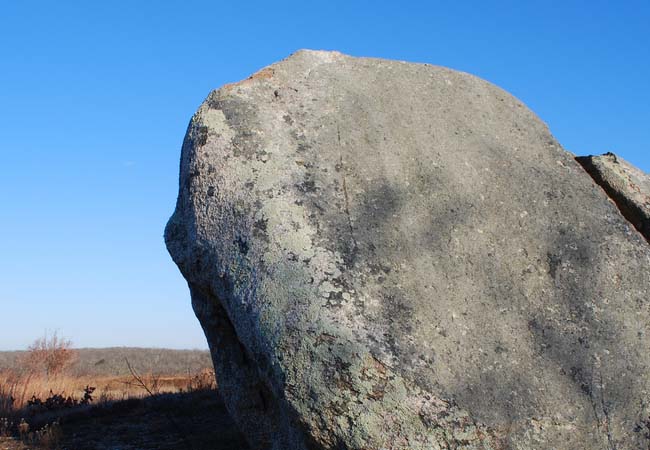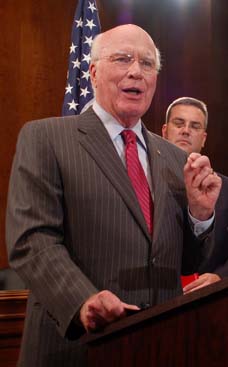
On Martha's Vineyard island, in the wealthy town of Chilmark where Barack Obama is vacationing this week, sits a strange, rather ancient stone wall hidden in the protected woodlands. It ends at a large boulder – Waskosim's Rock – perched atop a hill. The wall, known locally as "the Middle Line," is a kind of New World version of the Great Wall of China. Laid out in the 17th century, it separated lands claimed by the English from those of the indigenous Wampanoag people. The Middle Line was a Puritan era plea for racial peace: Can't we all just get along? Unfortunately, the answer was "No." Not long after the boundary was laid down, transgressions recommenced. The Wampanoags retreated even farther west, winding up near the Gay Head cliffs, where they remain to this day. Although a colonial-period Indian war never broke out on Martha's Vineyard, bitterness has persisted through the four centuries, symbolized by the wall itself. Indians often talk about "the white man" in angry tones; whites frequently use the words "we" and "they" when talking about the history of the conflict, even if their own ancestors arrived long after the wall's construction. When President Obama chose Martha's Vineyard as his summer destination, he chose an 87-square-mile island that, despite its size, is a microcosm of the race problem that burdens America. Before I became a journalist, I served as a Peace Corps volunteer in Senegal. Since then I have returned to Africa many times. My career has also taken me frequently to Europe, the Caribbean, and Mexico. All over the world, I have had insightful and challenging conversations about race, empire, and development. All over the world, that is, except in my own nation.
Senegal RPCV Wendy Williams writes: Martha's Vineyard is a microcosm of the race problem that burdens America
History's shadow over Obama's Vineyard vacation
Despite its tiny size, Martha's Vineyard is a microcosm of the race problem that burdens America.
By Wendy Williams
from the August 24, 2009 edition
Caption: Waskosim's Rock
Mashpee, Mass. - On Martha's Vineyard island, in the wealthy town of Chilmark where Barack Obama is vacationing this week, sits a strange, rather ancient stone wall hidden in the protected woodlands.
It ends at a large boulder – Waskosim's Rock – perched atop a hill. The wall, known locally as "the Middle Line," is a kind of New World version of the Great Wall of China. Laid out in the 17th century, it separated lands claimed by the English from those of the indigenous Wampanoag people.
The Middle Line was a Puritan era plea for racial peace: Can't we all just get along?
Unfortunately, the answer was "No." Not long after the boundary was laid down, transgressions recommenced. The Wampanoags retreated even farther west, winding up near the Gay Head cliffs, where they remain to this day.
"You're seeing an example of colonists and Indians trying to find a way to deal with their problems without shedding each other's blood," says historian David J. Silverman, who wrote an excellent account of this subject, "Faith and Boundaries."
Although a colonial-period Indian war never broke out on Martha's Vineyard, bitterness has persisted through the four centuries, symbolized by the wall itself. Indians often talk about "the white man" in angry tones; whites frequently use the words "we" and "they" when talking about the history of the conflict, even if their own ancestors arrived long after the wall's construction.
When President Obama chose Martha's Vineyard as his summer destination, he chose an 87-square-mile island that, despite its size, is a microcosm of the race problem that burdens America.
But on this island, there exist some very ironic twists. Our president will reportedly be staying at Blue Heron Farm, one of the island's most expensive gentleman's farms, purchased recently for about $20 million by William and Molly Van Devender, whites from Mississippi and big-time financial supporters of the Republican Party.
Our president will vacation on land once allotted to the Wampanoags during the Middle Line era – an historical fact with which the president himself is probably unfamiliar. And today, because Massachusetts law allows ownership down to the mean low-tide mark, even walking the beachfront is forbidden to the indigenous people.
Should our Kansan-Kenyan-American president feel guilty? If the land had been lifted from local people three years ago, instead of 300, would that make a difference?
Obama could chew over these questions at length with his friend Henry Louis Gates, were he so inclined. This past Thursday, Professor Gates hosted his annual forum on race relations at the Vineyard's Old Whaling Church, built in 1843 by very wealthy and very white whaling captains.
This year's program was entitled "Achieving Equality in the Age of Obama." None of the evening's panelists were Wampanoag.
Gates lives in a large white house on land also once claimed by the Wampanoag. When it comes to that house, he is not without awareness of racial overtones. He has held fund-raisers for Obama and for Massachusetts Gov.Deval Patrick in the house, and he once told island journalist Laura Roosevelt that he loves the irony of the building's "neo-plantation look." He also said "the Island must have the highest concentration in the world of successful, middle- and upper-class black people."
Should he feel guilty? Should he pay reparations to the Wampanoag tribe?
I ask not to make Gates wrong, but to point to a larger issue that America must eventually face head on: What is the value of knowing our history, if we cannot transcend it? How do we hold on to our history, honor those who have been disenfranchised – and still move forward confidently into the 21st century?
"Something there is that doesn't love a wall," warned New Englander Robert Frost in his poem "Mending Wall" nearly a century ago.
"Before I built a wall I'd ask to knowWhat I was walling in or walling out,And to whom I was like to give offence."
Before I became a journalist, I served as a Peace Corps volunteer in Senegal. Since then I have returned to Africa many times. My career has also taken me frequently to Europe, the Caribbean, and Mexico. All over the world, I have had insightful and challenging conversations about race, empire, and development.
All over the world, that is, except in my own nation.
Wendy Williams lives on Cape Cod in Mashpee, said to be the nation's first Indian Plantation, on land that once belonged to the Wampanoag tribe.













